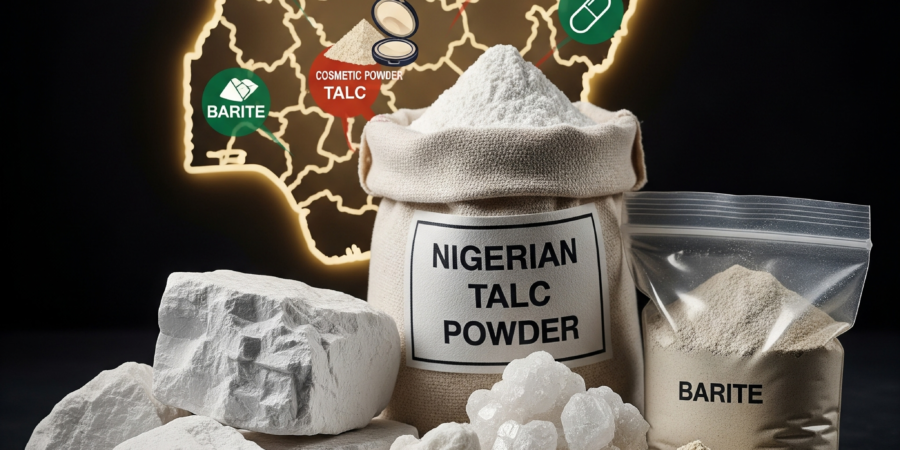While the spotlight often shines on gold and lithium, the true workhorses of the global industrial economy are minerals like talc and barite. These non-metallic minerals, though less glamorous, are indispensable to a wide range of industries, from oil and gas to cosmetics and pharmaceuticals. Nigeria is sitting on massive, largely untapped reserves of both.
This guide provides a comprehensive look at the profitable opportunities in the talc and barite value chains. We will delve into their key uses, their locations, and the essential steps you need to take to become a successful exporter of these high-demand industrial minerals.
1. Talc: The Mineral with a Thousand Uses
Talc, a clay mineral composed of hydrated magnesium silicate, is known for its incredible softness, whiteness, and chemical inertness. These unique properties make it a highly versatile industrial mineral.
- Industrial Uses:
- Plastics & Ceramics: Used as a filler to improve durability and heat resistance.
- Paints & Coatings: Adds opacity and a smooth finish.
- Cosmetics & Pharmaceuticals: The primary ingredient in baby powders, cosmetics, and drug excipients due to its softness.
- Nigerian Reserves & Locations: Nigeria is blessed with over 40 million tonnes of talc deposits, primarily in Niger, Osun, Kogi, Ogun, and Kaduna states. The Raw Materials Research and Development Council (RMRDC) has a catalytic processing plant in Niger State, but it is the only one in the country. This creates a massive opportunity for investors to build processing plants that can meet both local and export demand.
2. Barite: The Oil & Gas Powerhouse
Barite (barium sulfate) is a non-metallic mineral whose primary value lies in its high specific gravity. This makes it an essential material for the oil and gas industry.
- Industrial Uses:
- Drilling Fluid: Over 80% of global barite production is used as a weighting agent in drilling muds. Its high density helps to counteract high-pressure formations and prevent hazardous blowouts during oil and gas exploration.
- Paints & Fillers: Used as a white pigment in paints and as a filler in rubber, plastics, and paper.
- Medical: It is used as a contrast agent in medical diagnostic tests.
- Nigerian Reserves & Locations: Nigeria has an estimated 7.5 million tonnes of barite reserves, with deposits scattered across the Benue Trough and other regions. Key states with proven deposits include Taraba, Bauchi, Adamawa, Nasarawa, Cross River, and Benue.
The Critical Challenge & Opportunity: Beneficiation
While Nigeria has vast reserves of barite, the quality of the ore often falls below the minimum specific gravity (4.2) required by the American Petroleum Institute (API) for drilling operations. This has historically forced oil companies in Nigeria to import higher-grade barite, leading to a massive loss of revenue and foreign exchange.
This is your opportunity. Recent studies and a major policy push from the government prove that local beneficiation techniques (like jigging and flotation) can process low-grade Nigerian barite to meet or even exceed international standards. The Nigerian Content Development and Monitoring Board (NCDMB) has also approved a ban on imported barite to encourage local production. This creates a high-value, protected market for investors who are willing to invest in in-country processing.
The Path to Export: Your Legal & Logistics Checklist
To legally export talc or barite, you must follow the correct process, which we have detailed in our previous guides. A quick checklist includes:
- Obtain a valid Mining Lease from the MCO.
- Get a Mineral Export Permit from the MSMD.
- Register with the NEPC as an exporter.
- Ensure your goods have a Clean Certificate of Inspection (CCI) and a Certificate of Origin.
📘 The Nigeria Mineral Trading & Licensing Blueprint (2026 Edition)
If you are serious about buying, selling, or trading minerals legally in Nigeria, you cannot afford to rely on guesswork, outdated advice, or hearsay. The regulatory environment is tightening fast, and costly mistakes now lead to permit denials, seizures, or permanent blacklisting.
That’s why we created The Nigeria Mineral Trading & Licensing Blueprint: 2026 Guide to Buying Center Licenses & Purchase Permits — an updated, clear, step-by-step, insider guide that shows you exactly how to obtain Mineral Buying Center Certificates, Purchase & Possession Permits, and related approvals without delays or regulatory traps.
This guide distills real regulatory procedures for 2026, compliance requirements, and practical insights used by serious operators — saving you months of confusion, wasted money, and avoidable risk.
If mineral trading is part of your business future, this blueprint is not optional — it’s protection.
Finally, if you are a serious investor who wants to move quickly and avoid the hidden costs of red tape, our Mining & Mineral Trading Company Setup (Nigeria) service is a done-for-you solution that handles every aspect of your legal and regulatory setup, saving you time and money.
Once your business is legally established, the Nigerian Mineral Exchange provides a platform for you to sell your legally-sourced minerals to a global audience, turning your compliance into a competitive advantage.
READ ALSO:





Leave a Reply